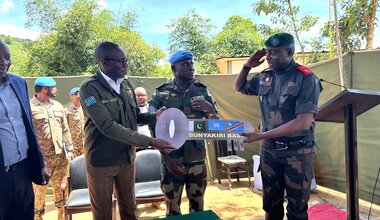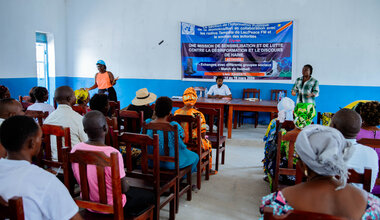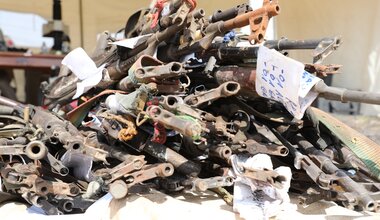The UNJHRO supports the Sensitization on the law on the criminalization of tortures in the DRC
Uvira, 8 July 2015
– The United Nations Joint Human Right Office, UNJHRO, in collaboration with Sukula II military operations command in the South-Kivu province and the local Military Public Prosecution Office organized on Wednesday 8 July 2015 in Uvira a sensitization on the Act No 0011/008 of 9 July 2011 bearing on the criminalization of torture in the DRC. This activity is part of the commemoration of the International Day in support of the victims of torture commemorated on 26 June of each year.
It brought together 35 Officers of the regular Armed Forces of the DRC (FARDC) drawn from the different Infantry Regiments and Battalions of the Territories of Uvira and Fizi. Besides the message of the United Nations Secretary-General read on the occasion, there were two presentations.
The first presentation, given by UNJHRO, focused on legal prosecutions for the crimes of torture by the International Courts and Tribunals. John Kiza of the UN Joint Human Rights Office MONUSCO-Uvira recalled that the crimes of torture are a gross human rights violation which, depending on the case, may constitute a war crime or crime against humanity.
The second presentation, given by the assistant military district attorney of Uvira Garrison, Lieutenant-Magistrate Nixon Sombalay Kabeya, focused on the national legislation bearing on criminalization of torture in the Democratic Republic of Congo. The latter presented the elements that form an act of torture under the national law as well as the sanctions provided for to repress torture. He further recalled “the non-application of the statutory limitation to the crime of torture.” “Those who perpetrate the crime of torture can be prosecuted at any time (now or later) and only death can put an end to the prosecution,” explained Lieutenant-Magistrate S. Kabeya.
After the two presentations, participants formed working groups that reflected on some concrete cases relating to a situation whereby military personnel while in operations have arrested armed groups combatants and civilians suspected of being their accomplice; they hold in custody and subject them to acts of torture. This exercise helped them define the different types of torture, military officers’ conducts and the right procedure to follow when dealing with those commit acts of torture.
At the end of the highly rich sensitization and brainstorming sessions, some recommendations were issued to the participants by General Safari Gustave Bwange Safari, Sector Sukula II commander of the South-Kivu province who called on the trainees to make the most of the teachings received and debrief their different Units with a view to sensitizing more military personnel. He further recommended that the military Judiciary Police Officers in charge of investigations gather reliable evidence and work in good collaboration with the military Justice after deferring presumed perpetrators to appropriate institutions.
In his closing remark, General Gustave Bwange Safari pledged to work for “zero case of torture, zero trial” in the FARDC regarding Human rights violations, more particularly the crime of torture.
Jean-Tobie Okala
 ONU
ONU Nations Unies Maintien de la paix
Nations Unies Maintien de la paix


